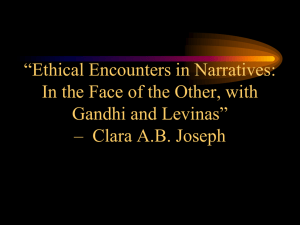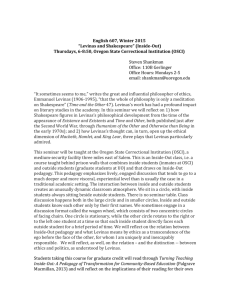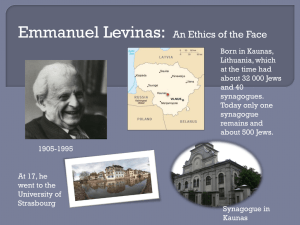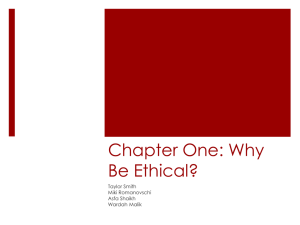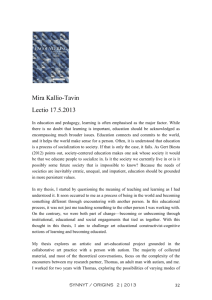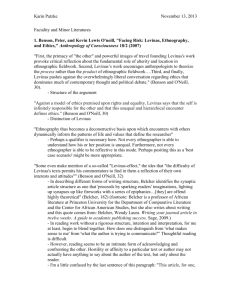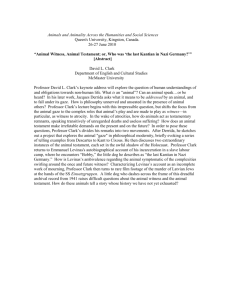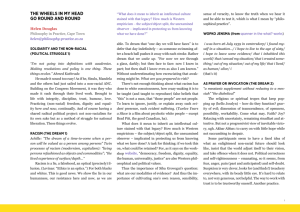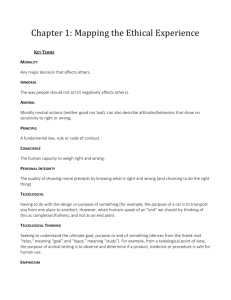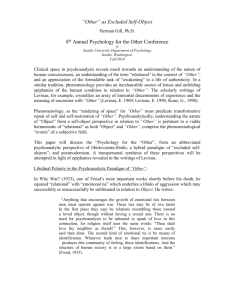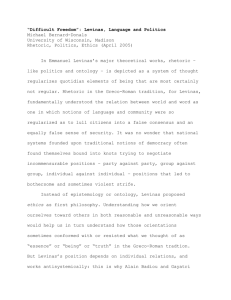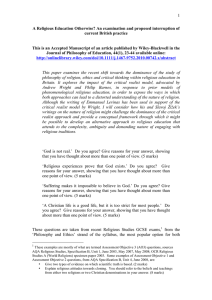Syllabus - University of Oregon
advertisement
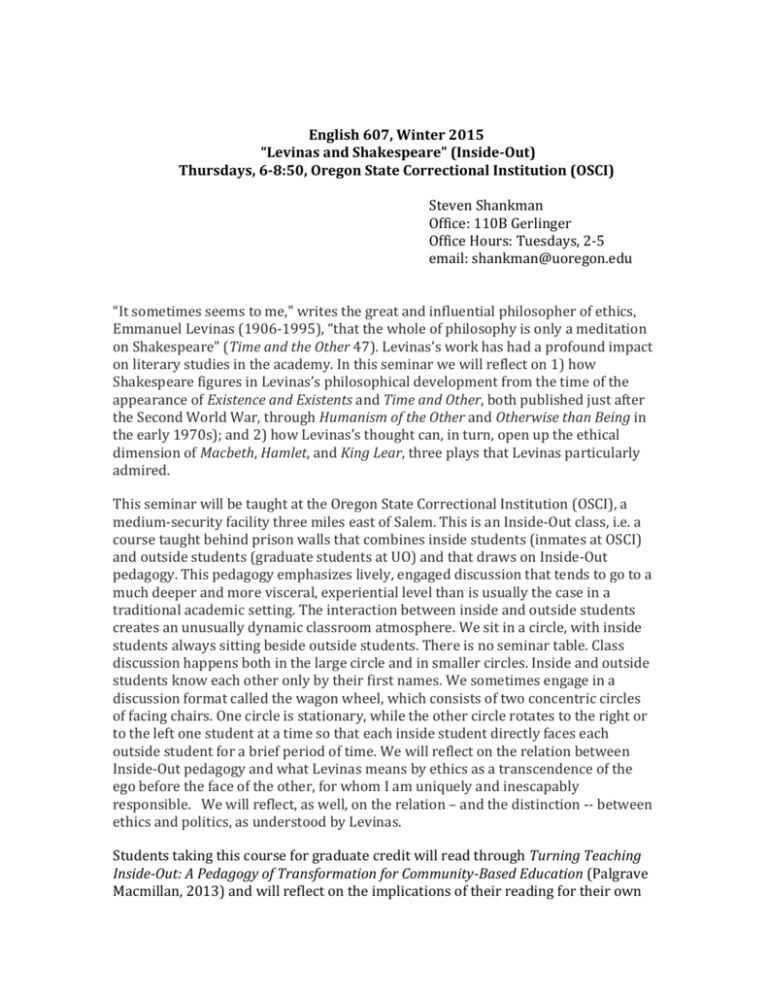
English 607, Winter 2015 “Levinas and Shakespeare” (Inside-Out) Thursdays, 6-8:50, Oregon State Correctional Institution (OSCI) Steven Shankman Office: 110B Gerlinger Office Hours: Tuesdays, 2-5 email: shankman@uoregon.edu “It sometimes seems to me,” writes the great and influential philosopher of ethics, Emmanuel Levinas (1906-1995), “that the whole of philosophy is only a meditation on Shakespeare” (Time and the Other 47). Levinas’s work has had a profound impact on literary studies in the academy. In this seminar we will reflect on 1) how Shakespeare figures in Levinas’s philosophical development from the time of the appearance of Existence and Existents and Time and Other, both published just after the Second World War, through Humanism of the Other and Otherwise than Being in the early 1970s); and 2) how Levinas’s thought can, in turn, open up the ethical dimension of Macbeth, Hamlet, and King Lear, three plays that Levinas particularly admired. This seminar will be taught at the Oregon State Correctional Institution (OSCI), a medium-security facility three miles east of Salem. This is an Inside-Out class, i.e. a course taught behind prison walls that combines inside students (inmates at OSCI) and outside students (graduate students at UO) and that draws on Inside-Out pedagogy. This pedagogy emphasizes lively, engaged discussion that tends to go to a much deeper and more visceral, experiential level than is usually the case in a traditional academic setting. The interaction between inside and outside students creates an unusually dynamic classroom atmosphere. We sit in a circle, with inside students always sitting beside outside students. There is no seminar table. Class discussion happens both in the large circle and in smaller circles. Inside and outside students know each other only by their first names. We sometimes engage in a discussion format called the wagon wheel, which consists of two concentric circles of facing chairs. One circle is stationary, while the other circle rotates to the right or to the left one student at a time so that each inside student directly faces each outside student for a brief period of time. We will reflect on the relation between Inside-Out pedagogy and what Levinas means by ethics as a transcendence of the ego before the face of the other, for whom I am uniquely and inescapably responsible. We will reflect, as well, on the relation – and the distinction -- between ethics and politics, as understood by Levinas. Students taking this course for graduate credit will read through Turning Teaching Inside-Out: A Pedagogy of Transformation for Community-Based Education (Palgrave Macmillan, 2013) and will reflect on the implications of their reading for their own 2 approach to teaching. Each graduate student will be assigned one of the seven parts of the book to read. They will summarize and evaluate their assigned sections, print out their summaries and evaluations before our class meetings, and they will share them with inside and outside students. Inside students will sign up for the course at either the 400- or 500-level. This course on ethics and literature promises to be transformational for graduate students on many levels, including for how they think about their own approach to teaching literature. Graduate students may well find themselves drawn to being trained to teach Inside-Out classes of their own, or to teaching in unconventional settings. This will be the first graduate Inside-Out course ever taught at the University of Oregon. Transportation will be provided up to Salem and back each week. We will leave campus promptly at 4 p.m. and will return by 10:15 or 10:30 that evening. Required Texts for Purchase Emmanuel Levinas, Ethics and Infinity, trans. R. Cohen (Duquesne UP, 1985) Levinas, Time and the Other, trans. R. Cohen (Duqesne UP, 1987) Levinas, Existence and Existents, trans. Lingis (Duquesne UP, 2000) Shakespeare, Macbeth, Hamlet, Lear (all in The Arden Shakespeare series) Text on Reserve Simone Weil Davis and Barbara Sherr Roswell (eds.), Turning Teaching Inside Out: A Pedagogy of Transformation for Community-Based Education (Palgrave Macmillan, 2013) I. Jan. 8: Introduction; ice-breaking exercises. Levinas, Ethics and Infinity, Chapter 7 (“The Face”); Chapter 3 (“The ‘There Is’”) II. Jan. 15: Levinas, Existence and Existents, Preface and Chapter II (“The World”); Macbeth, Acts I and II. Summary and evaluation of the preface and Chapter 1 of Turning Teaching Inside-Out will be distributed to all the seminar participants. III. Jan. 22: Levinas, Existence and Existents, Chapter III (“Existence Without a World”); Macbeth, Act III and IV. Summary and evaluation of Part I (“Origin Tales: Seeding and Building a Program”) of TTIO (chapters 2-4) will be distributed. IV. Jan 29: Levinas, Time and the Other, Part I (pp. 39-57); Macbeth, Act V. Summary and evaluation of Part II (“Expanding Teaching and Learning”) of TTIO (chapters 5-10) will be distributed. V. Feb. 5: Levinas, Time and the Other, Part II (pp. 58-66); Hamlet, Acts I and II; Ethics and Infinity, Chapter 4 (“The Solitude of Being”). Summary and 3 evaluation of Part III (“Productive Intersectionality: Navigating Race, Place, Gender, and Class”) of TTIO (chapters 11-14) will be distributed. VI. Feb. 12: Levinas, Time and the Other, Part III (pp. 67-79); Hamlet, Acts III and IV. Summary and evaluation of Part IV (“Transformation? Connection as Catalyst”) of TTIO (chapters 15-20) will be distributed. VII. Feb. 19: Levinas, Time and the Other, Part IV (pp. 80-94); Ethics and Infinity, Chapter 6 (“Secrecy and Freedom”); Hamlet, Act V. Summary and evaluation of Part V (“Yardsticks and Roadmaps: Assessing Change”) of TTIO (chapters 21-23) will be distributed. VIII. Feb. 26: King Lear, Acts I and II; Levinas, Ethics and Infinity, Chapter 5 (“Love and Filiation”). Summary and evaluation of Part VI (“Leaning into the Future: Helping Change Endure”) of TTIO (chapters 24-26) will be distributed. IX. March 5: Lear, Acts III and IV; Steven Shankman, “Reading the Russian Novel in Prison After Levinas,” Turning Teaching Inside-Out, pp. 143-53; Tony Vick, “Look at Me!”, Turning Teaching Inside-Out, pp. 155-56. [NOTE: it is likely that I will be out of town on March 5, in which case we will not meet this week. We will discuss this week’s reading the following week, along with the assigned reading for March 12.] X. March 12: Lear, Act V; Steven Shankman, “From Solitude to Maternity: Levinas and Shakespeare,” Levinas Studies, Vol. 8 (2013), pp. 67-79. Summary and evaluation of Part VII (“Closing Circle”) of TTIO (chapters 27-29) will be distributed. XI. March 19: Graduation ceremony and closing circle. Students will submit weekly response papers on the assigned reading. Each student will write a final seminar paper of 10-15 pp. The final paper for outside students is due Monday, March 16 by 5 p.m.; the final paper for inside students is due Thursday, March 19 at 6 p.m., before the graduation ceremony.
